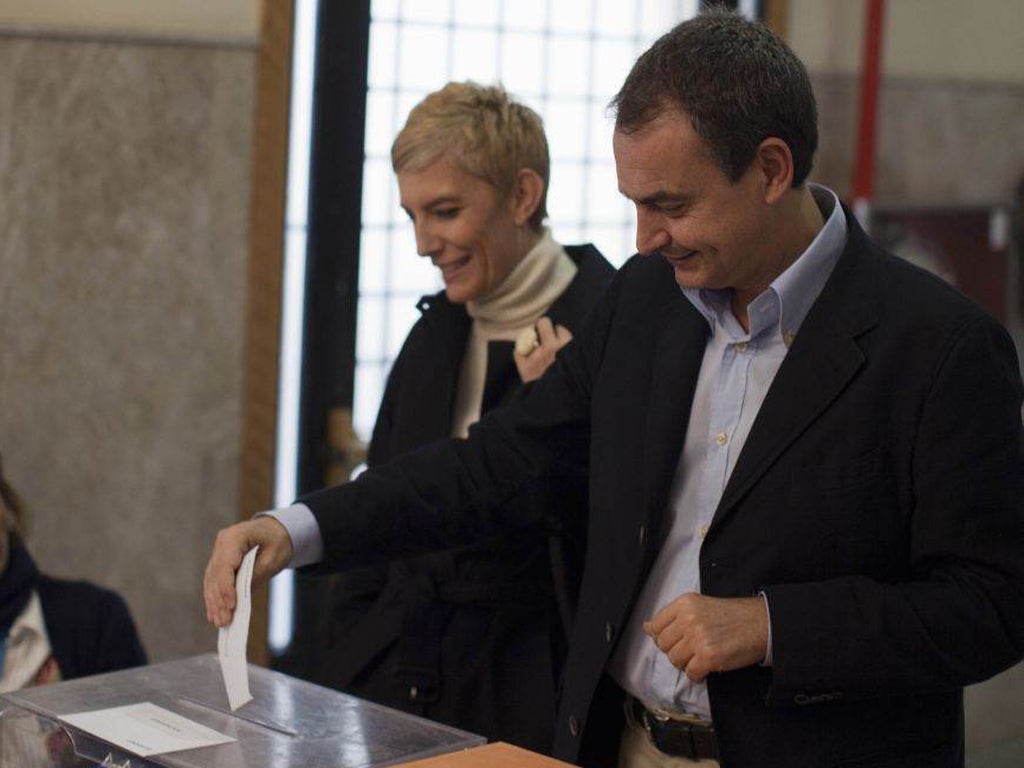Spain votes in elections dominated by economy

Your support helps us to tell the story
From reproductive rights to climate change to Big Tech, The Independent is on the ground when the story is developing. Whether it's investigating the financials of Elon Musk's pro-Trump PAC or producing our latest documentary, 'The A Word', which shines a light on the American women fighting for reproductive rights, we know how important it is to parse out the facts from the messaging.
At such a critical moment in US history, we need reporters on the ground. Your donation allows us to keep sending journalists to speak to both sides of the story.
The Independent is trusted by Americans across the entire political spectrum. And unlike many other quality news outlets, we choose not to lock Americans out of our reporting and analysis with paywalls. We believe quality journalism should be available to everyone, paid for by those who can afford it.
Your support makes all the difference.Spanish Socialist leader Alfredo Perez Rubalcaba looks to have no chance in today's election race against conservative rival Mariano Rajoy.
Rubalcaba, an articulate former interior minister and deputy premier, is one of Spain's most respected politicians. As a youth he clocked 10.9 seconds for the 100-metre dash.
But while his approval rating is as high as Rajoy's, or higher in some polls, voters crucially do not see him as the best manager for the country's deep economic woes.
Polls show Rajoy's People's Party (PP) winning a landslide in the parliamentary poll as the Socialists are punished for a persistent economic crisis that has saddled Spain with the European Union's highest unemployment rate and suffering painful austerity measures.
Rubalcaba has tried to paint Rajoy as a leader who will destroy the public health service and other treasured Spanish institutions, but he lost the only debate between the two candidates and critics said he spoke as though his opponent was already in office.
"We must protect workers and the unemployed and I believe you are not going to do that," Rubalcaba said in the televised debate.
Born in northern Spain, bald and bearded Rubalcaba, 60, is a chemist who has lectured at Spanish and foreign universities and listens to classical music on his iPod.
When unpopular Socialist Prime Minister Jose Luis Rodriguez Zapatero announced earlier this year he would not seek a third term and moved the election up to November from next March, Rubalcaba was seen as the party's safest bet to limit the PP's almost certain victory.
But he has struggled to differentiate himself from Zapatero, for whom he had the tough job of chief spokesman as unemployment soared and austerity was imposed to try to avoid Spain being drawn into the euro zone debt crisis.
As Spaniards struggled with towering household debt and one in five unemployed, Rajoy's restrained campaign benefited from the Socialists' mistakes.
Rubalcaba is seen as having worked hard behind the scenes for many years on some of Spain's toughest problems, such as cracking down on the Basque separatist group ETA, which declared an end to its four-decade armed struggle in October.
"Rubalcaba has a bit of novelty, his reputation as a mysterious schemer, but the government's bad image right now really harms him. Whatever his personality qualities are, voters see him as just another Socialist," said Juan Diez, president of the Sociological, Economic and Political Analysis (ASEP) research firm.
A fan of the Real Madrid football team, Rubalcaba is renowned as a tactician with a sharp eye for detail. Among Spain's most experienced politicians, he is known for his agile parliamentary rhetoric, at times as entertaining as it can be vicious.
Reuters
Join our commenting forum
Join thought-provoking conversations, follow other Independent readers and see their replies
Comments